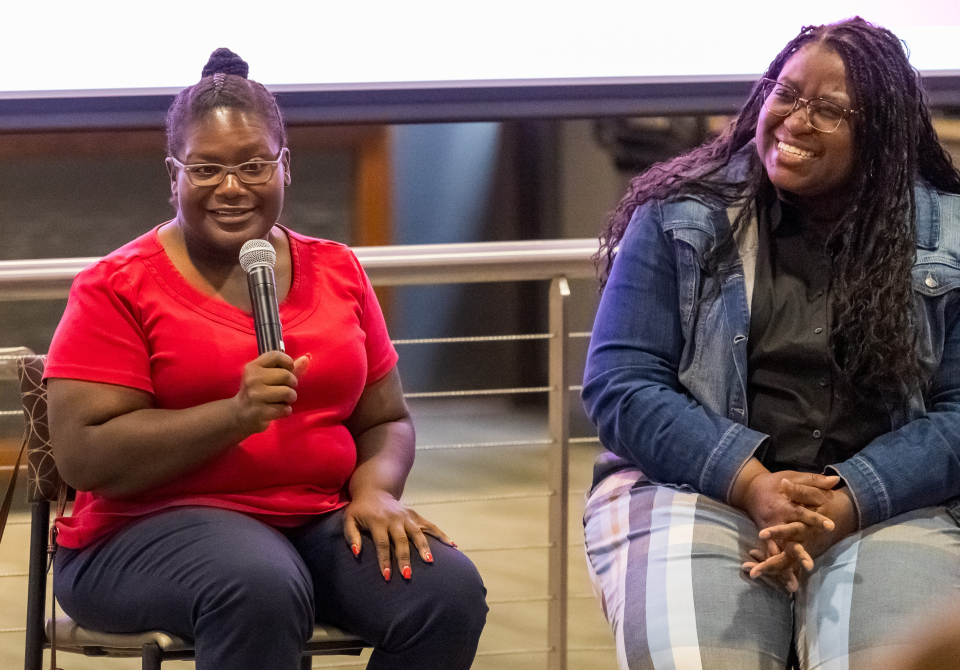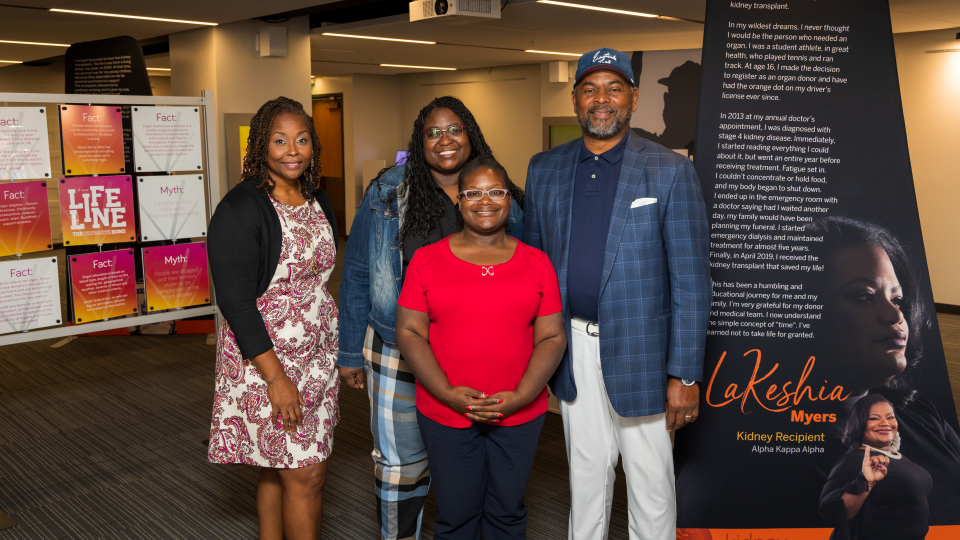
I tell people about the gory details. People need to know what people who have these issues are going through.
LaKeshia Myers was only 30 when her kidneys started to shut down.
A routine physical revealed her blood pressure climbing to dangerous levels. “My doctor told me with the blood pressure I had, I should be having a stroke,” she recalled.
The diagnosis: stage 4 kidney disease. Her renal system began to fail, so she started dialysis — daily treatments to cleanse her kidneys that left permanent scars on her chest — before she got a transplant in 2019.
“I tell people about the gory details,” said Myers, who represents northwestern Milwaukee in the Wisconsin State Assembly. “People need to know what people who have these issues are going through.”
Myers shared her story September 6, 2024, at Milwaukee Area Technical College as part of a panel discussion and organ transplant exhibit sponsored by the Versiti Blood Center of Wisconsin.
The exhibit, “Lifeline: The Ultimate Bond,” is designed to raise awareness of the importance of organ donations, especially in multiethnic communities. It is on display at MATC’s Create Gallery, which is located in the Main Building at the Downtown Milwaukee Campus.
The exhibit includes the stories of eight transplant recipients; facts, figures and statistics of organs, including the kidney, liver, heart and lungs; and artwork commissioned from local artists. It opened in August, which is National Multiethnic Donor Awareness Month, and runs through Saturday, September 14.
“We’re trying to save lives by bringing awareness about the importance of organ and tissue donation,” said discussion moderator Tonnie Boston, Versiti’s senior manager of community relations and outreach. “There are 100,000 people currently on the organ transplant waiting list and 30% of them are Black. The need is very, very real, but the number of people registered to donate is still small.”
Appearing with Myers and Boston was Dr. Terra Pearson, a transplant surgeon at Froedtert Hospital, and Richard Lewis, a business consultant in Milwaukee. He was born with two healthy kidneys but eventually, both failed and needed to be replaced by the time he was 52. His first transplant was in 2004 and the second was in 2017.
Since then, Lewis has been on a crusade, sharing his testimony to educate and inspire people in his community and beyond. “I’m doing all I can to bring awareness to the overall need,” he said. “Almost everyone who knows anyone knows someone with organ failure. We try to educate people as much as possible as to why this is important.”
Dr. Pearson also works with Versiti to help spread a positive message about donation, particularly in the Black community through local churches and schools.
“The more diverse donors we have, the more people can get transplants, it’s really that simple,” Dr. Pearson said at the event. “Organ donation is a way to live on. Death comes for us all at some point, but donating an organ is a way that we can help others continue.”
Dr. Pearson also shared ways to minimize the chances of suffering serious health issues that could eventually necessitate transplants: Eat a balanced diet, decrease salt intake, exercise regularly, drink plenty of water, don’t smoke, see a doctor at least once a year, lower stress whenever possible, and be aware of family medical history.
Plus, discussing possible organ donation needs to be open and honest, Boston said. “Talk with your family when you make the decision to become a donor. Don’t make the decision in a silo,” she said. “This needs to be dinner table conversation.”
The Create Gallery at MATC is open Monday through Friday, from 10 a.m. to 4 p.m. creategallery@matc.edu.
About Versiti: Versiti is a fusion of donors, scientific curiosity and precision medicine that recognizes the gifts of blood and life are precious. We are home to the world-renowned Versiti Blood Research Institute, we enable lifesaving gifts from our donors, and we provide the science behind the medicine through Versiti's diagnostic laboratories. Versiti is a 501(c)(3) nonprofit organization.
About MATC: As Wisconsin’s largest technical college and one of the most diverse two-year institutions in the Midwest, Milwaukee Area Technical College is a key driver of southeastern Wisconsin’s economy and has provided innovative education in the region since 1912. More than 30,000 students per year attend the college’s four campuses and community-based sites or learn online. MATC offers affordable and accessible education and training opportunities that empower and transform lives in the community. The college offers more than 180 academic programs — many that prepare students for jobs immediately upon completion and others that provide transfer options leading to bachelor’s degrees with more than 40 four-year colleges and universities. Overwhelmingly, MATC graduates build careers and businesses in southeastern Wisconsin. The college is accredited by the Higher Learning Commission.

